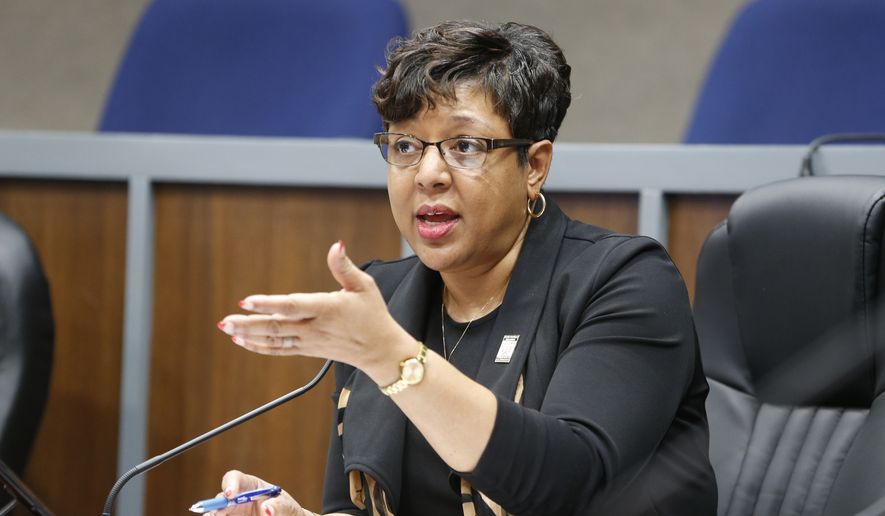Liberty University officials have given students the option to return to dorms on campus following the end of spring break earlier this week, prompting a swift backlash from local authorities who say the decision to allow students to live in residence halls is “reckless.”
Lynchburg Mayor Treney Tweedy addressed Liberty’s decision to allow students to return to campus during a Lynchburg City Council meeting Tuesday, suggesting she was misled by Liberty President Jerry Falwell Jr. regarding the number of students returning to their on-campus dorms.
But Mr. Falwell, who attracted attention early in the coronavirus pandemic for resisting calls to shut down the college and saying critics were really targeting President Trump, said the new criticism is overblown, that courses have been moved online,that social distancing measures are in place, and that Liberty’s dorms are staying open only for adult students who lack the means or transportation to go home.
Ms. Tweedy said Mr. Falwell told her only a “handful” of students unable to go home would be returning to campus, but Mr. Falwell told CNN on Wednesday that nearly 2,000 students were now back from break and residing in the dorms.
“I was very surprised and disappointed to later learn of President Falwell’s most recent decision to allow students back on campus,” Ms. Tweedy said Tuesday. “We are in the midst of a public health crisis. I am concerned for the students, faculty and employees at Liberty University, and I am also very concerned for the residents of the Lynchburg community.”
Liberty’s campus is home to about 15,000 residential students, about half of whom typically reside in campus housing facilities during the academic year. During Liberty’s spring break last week, Mr. Falwell said that almost all university classes would be moved online until the end of the semester in accordance with Virginia Gov. Ralph Northam’s declaration that banned all gatherings of more than 100 people. The governor’s mandate has now been updated and currently limits all gatherings in the state to 10 people or fewer.
After classes were moved online, residential students were given the option to return to dorm housing for the remainder of the semester if they desired. Of the roughly 2,000 who returned to campus, Mr. Falwell told CNN nearly 1,000 are international students unable to travel home due to the coronavirus.
Mr. Falwell told CNN he wanted to come on air to clear up “false reports” surrounding the university’s policies on COVID-19, the disease caused by the new coronavirus. News of students returning to Liberty’s campus prompted a firestorm among local media outlets in Lynchburg.
“These reports [about Liberty] have been overblown,” Mr. Falwell said. “The false reports started with a local newspaper article written here that was irresponsibly written, but we appreciate you allowing me to come on here and clear it up.”
Mr. Falwell told CNN the campus now resembles an “apartment complex” since all classes have now moved online, minus a few nursing labs and aviation classes, and students are unable to congregate in large numbers in university buildings.
In academic buildings on campus, there are signs that promote social distancing and ask students to sit at least six feet apart. The same rules apply in the campus dining halls, where only 10 students can enter at a time to grab food for takeout only.
On Tuesday, Mr. Northam called on Mr. Falwell during a press briefing, quoting the Bible and asking the university president to consider the best course of action for Liberty students and the community.
“Proving faithful means providing clear and consistent guidance” Mr. Northam said, “and it means respecting the duty that Liberty University has to its students, its staff, the Lynchburg community in which it is located in our commonwealth.”
Mr. Falwell responded on Twitter Thursday that the governor’s rebuke is “unthinkable.”
“The Governor’s [call] that [students] should should be banned or discouraged from choosing to utilize the food and shelter that they paid for in a time of crisis is unthinkable,” Mr. Falwell tweeted. “The only Liberty students that are here are adult students who have concluded that this is the only place they have or safest and best place to be, among what may be limited options.”
Mr. Falwell continued in a later tweet, “If the City of Lynchburg would welcome students from across the state (and even the world) to return ’home’ to Lynchburg but expect the drawbridge to be pulled up to deny entry to Liberty students, it only serves to illustrate the height of hypocrisy that is going on today.”
Students who decided to return to campus say the campus resembles a ghost town.
“As far as the eye can see, I can’t see anyone out and about besides people walking back to their dorms,” one Liberty student on hall leadership told The Washington Times. “So [the campus] is pretty dead.”
Despite circulating fears among governing officials and scrutiny from the governor, a number of students do not seem to harbor negative thoughts about the university’s decision to keep residence halls open to those willing to return.
“I don’t feel any sort of concern [about being on campus], there’s police everywhere and like nobody is allowed to be in any of the food places except for 10 people [at a time],” the student said. “Campus feels totally fine.”




Please read our comment policy before commenting.